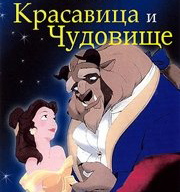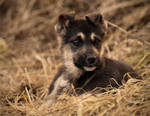Category: "Uncategorized"
Красавица
 The word красавица, which means “beautiful girl,” has the same root as «красивый», “beautiful or handsome”, «красота» “beauty” and «красный» “red.” Sometimes it can be translated as “beauty” as in the name of the famous fairy tales, «Спящая красавица» “Sleeping Beauty” and «Красавица и чудовище» “Beauty and the Beast.”
The word красавица, which means “beautiful girl,” has the same root as «красивый», “beautiful or handsome”, «красота» “beauty” and «красный» “red.” Sometimes it can be translated as “beauty” as in the name of the famous fairy tales, «Спящая красавица» “Sleeping Beauty” and «Красавица и чудовище» “Beauty and the Beast.”
When I think of красавица, I imagine a pretty girl from the Russian countryside of Gogol’s time. She is wearing a colorful dress and a kokoshnik-tiara. Her hair is neatly braided in one long thick braid, and her big brown eyes are coyly cast down. She is the classic «русская красавица» “Russian beauty” that has been praised by so many literary masters.

| Какая же ты красавица! Тебе так идёт зелёный! | "You are such a beauty! Green looks so good on you!" |
| — Вы видели невесту? Такая красавица! — Да, жених наверное себя самым счастливым чувствует! |
“Did you see the bride? Such a beautiful girl!!” “Yes, the groom probably feels that he is the luckiest!” |
The masculine form of this word is красавец “stud.” In day-to-day speech we sometimes use «красавец» or «красавчик» to express our approval or when we are pleasantly surprised with someone’s behavior:
| Ну, ты, конечно, красавчик! Ты пригласил её на свидание у всех на глазах! | Wow, you are the man! You asked her out in front of everybody! |
«Красавица» can be used in a similar way as well:
| Ты — красавица! Совсем не готовилась к экзамену и сдала с первого раза! | You go, girl! You didn’t study at all for the exam and yet passed it on the first try! |
 I have a personal history with this particular word. When I was a little girl, I could not pronounce some letters. The letter “r” gave me the most trouble. My mom would make me read and do various exercises for at least thirty minutes a day before I could go play with my friends. Needless to say, I really wanted to break this vicious cycle and learn to say the “r” right so I could finally go run around the yard. One day I was home alone, playing with my dolls. For some reason I decided to practice my “r’s”, using the word красавица. It came out so perfectly clear; I could not believe I had nobody home to brag about it to! I remember saying it over and over again, worried that I would lose it… but I never have. When I think about it, it is very neat that it was this word, красавица "beauty", that made my speech more beautiful!
I have a personal history with this particular word. When I was a little girl, I could not pronounce some letters. The letter “r” gave me the most trouble. My mom would make me read and do various exercises for at least thirty minutes a day before I could go play with my friends. Needless to say, I really wanted to break this vicious cycle and learn to say the “r” right so I could finally go run around the yard. One day I was home alone, playing with my dolls. For some reason I decided to practice my “r’s”, using the word красавица. It came out so perfectly clear; I could not believe I had nobody home to brag about it to! I remember saying it over and over again, worried that I would lose it… but I never have. When I think about it, it is very neat that it was this word, красавица "beauty", that made my speech more beautiful!
Собака на сене
Russians love their proverbs and pithy sayings. It is amazing how many of them we have and use excessively to express so many different emotions. It seems that we have one for every life situation. We love them almost as much as we do our swear words ![]() (Honestly, I once heard a guy speak using just swear words! Quite an experience, I might add…)
(Honestly, I once heard a guy speak using just swear words! Quite an experience, I might add…)
 «Собака на сене» is one of the very neat expressions we use. It is translated as “dog on hay”. The full saying goes: «собака на сене: и сама не ест, и другим не даёт», “dog on hay: she neither eats it herself, nor lets the others”. It is used when someone does not do something simply out of spite or uses something that others want just so they will not get it.
«Собака на сене» is one of the very neat expressions we use. It is translated as “dog on hay”. The full saying goes: «собака на сене: и сама не ест, и другим не даёт», “dog on hay: she neither eats it herself, nor lets the others”. It is used when someone does not do something simply out of spite or uses something that others want just so they will not get it.
| Она - как собака на сене: она не любит его, но не дает ему найти другую. | “She is like a 'dog on hay': she does not love him but she will not allow him to find someone else.” |
| Моя жена вегетарианка, поэтому дома мы не едим мясо. Она как собака на сене: и сама не ест, и нам не даёт! | “My wife is a vegetarian; therefore, we do not eat meat at home. She is like a dog on hay: she neither eats it herself, nor lets us!” |
Here is how my kitty demonstrates it: ![]()

| Моя кошка любит спать на крышке унитаза - ну, не собака ли на сене? | “My cat likes to sleep on the toilet cover – she is a regular dog on hay, isn’t she? |
There is a really great play written by Lope De Vega that is called «Собака на сене». There a beautiful duchess falls in love with her secretary. She cannot be with him because of the difference in their social status, but at the same time her jealousy is driving her crazy. She is torn between what her honor dictates her and what her heart yearns for. That makes her act like the dog in the proverb: she does not commit to either being with her love or agree to let him go. It is a beautiful love story with a very happy ending.
This play was staged and made into a movie in 1977 by a talented director, Yan Frid. This adaptation is very popular and much loved in Russia. I would recommend for everyone to see it!
Ужасно
 Some words in Russian have an interesting quality to them: they can express both positive and negative feelings. «Ужасно» ‘terribly’ is one of these words. It is important to note, though, that in either case the feeling is very strong. Therefore, it will most likely be followed by an exclamation mark.
Some words in Russian have an interesting quality to them: they can express both positive and negative feelings. «Ужасно» ‘terribly’ is one of these words. It is important to note, though, that in either case the feeling is very strong. Therefore, it will most likely be followed by an exclamation mark.
Ужасно comes from the noun «ужас», which means “horror.” The root produces other words like «ужастик» “horror movie,” so called, of course, because it horrifies you. ![]() For example:
For example:
| — Какое у тебя любимое кино? — Ну, не знаю, главное, чтобы это был ужастик: люблю, когда страшно! |
“What is your favorite movie?” “Well, I'm not sure, but it's got to be a horror movie. I love being scared!” |
Also, «ужас» can express one’s reaction to a misfortune of some sort.
| — Меня уволили с работы! — Какой ужас! Что же ты теперь будешь делать? |
“I was fired from work!” “That's terrible! What are you going to do now?” |
| Ужас! Я провалил экзамен по математике! | Oh, no! I flunked my math test! |
In English the adverb ‘awfully’ can be used to mean ‘very’ in both positive and negative contexts. For instance, you can say “She's awfully pretty” in the sense of “She is very pretty,” or you can say “He's awfully stupid” in the sense of “He is very stupid.” Similarly in Russian the adverb «ужасно» ‘horribly’ can mean “very much” or ‘absolutely’ or ‘really’ in both positive and negative contexts:
| Мне ужасно понравилась эта книжка! | I absolutely loved this book! |
| Я ужасно устал! | I’m awfully tired! |
| Я ужасно хочу поехать в Европу! | I really want to go to Europe! |
| Я ужасно люблю мороженое! | I’m awfully fond of ice cream! |
Even though the meanings are quite different, it is usually easy to understand which one is being used according to the situation. However, I hope you all will only need to use this word's positive meaning! ![]()
Чудесно

Чудесно is one of the words in Russian language that reflects a feeling of satisfaction and pleasure. It comes from the word «чудо», which means wonder or miracle. It is close in meaning to «очень хорошо», "very well/good" and «отлично», "excellent." It is also used as an expression of consent. (source)
Although people still say it fairly often, it was more commonly used in classic literature. I can imagine «барышня», a "young lady" from one of Pushkin's works, exclaim:
| Чудесно, папенька! Я так люблю верховую езду! | Wonderful, daddy! I love horseback riding! |
A slightly distorted version of «чудесно» also appears in Lewis Carroll's «Алиса в Стране Чудес», "Alice in Wonderland". Russian translation of "curiouser and curiouser" is «всё чудесатее и чудесатее». Just as in English, it is an incorrect use of the word. The writer made it up to show that Alice was so surprised that she forgot the proper way of saying it.
When I was little, I would listen to "Alice in Wonderland" on our old vinyl record player and imagine how it would be to find myself there, meet the Cheshire cat or follow the white rabbit... Oh, how nice would it be to escape into Страна Чудес “Wonderland”!
Стоять
The verb стоять means “to stand”:
| Imperfective | Perfective | |
| Infinitive | стоять | постоять |
| Past | стоял стояла стояло стояли |
постоял постояла постояло постояли |
| Present | стою стоишь стоит стоим стоите стоят |
No such thing as perfective present in Russian. |
| Future |
буду стоять будешь стоять будет стоять будем стоять будете стоять будут стоять |
постою постоишь постоит постоим постоите постоят |
| Imperative | стой(те) | постой(те) |
In the “stand” meaning it's used pretty much like one would expect:
| В парке я услышал, как играли на гитаре. Музыка была так красива, что я там постоял минут пятнадцать, не двигаясь. | In the park I heard someone playing the guitar. The music was so beautiful that I stood there for about fifteen minutes without moving. |
| Дима, чего ты там стоишь? Пойди на кухню и помоги маме. | Dmitri, what are you standing there for? Go to the kitchen and help your mother. |
The Russians use the verb стоять much more than English speakers use the word “to stand.” Very often if an object is stationed somewhere in a vertical position, the Russians will use it where an English speaker will simply use the verb “to be”:
| На столе стояла ваза с цветами. | There was a vase full of flowers on the table. |
| В моей спальне стоят два шкафа. | There are two armoires in my bedroom. |
The command form is often used in the sense of “stop” or “don't move”:
| Стой! Не двигайся! Подъезжает машина! | Stop! Don't move! There's a car coming! |
| Стой, а то наступишь на змею! | Don't move, or you'll step on a snake! |
<< 1 ... 24 25 26 ...27 ...28 29 30 ...31 ...32 33 34 ... 41 >>











